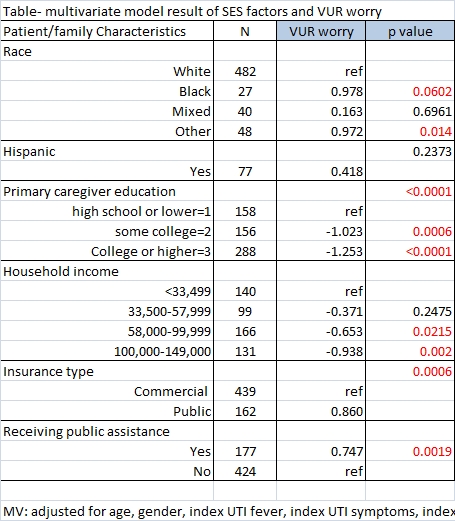Association of social factors with reported quality of life, functional status, and worry among parents of children with vesicoureteral reflux
HsinHsiao Wang, MD, MPH, MBAn, Caleb Nelson, MD, MPH.
Boston Children's Hospital, Boston, MA, USA.
Background: Little is known about the social and functional impact of vesicoureteral reflux (VUR) on quality of life for patients and families.. Our objective was to evaluate quality of life (QOL) and functional metrics among these families in a large RCT of VUR patients, and identify clinical and socioecomomic factors associated with these outcomes.
Methods: We analyzed data from the RIVUR trial from NIDDK. We examined outcomes including a composite functional score (functional status II, range from 0-100), parental worry regarding VUR (range from 0-10), study drug compliance (range from 0-10), and financial burden (range from 0-10). Univariate and multivariate regression models were fit to investigate the association between each of these outcomes and clinical (index UTI characteristics, family history, bladder and bowel dysfunction (BBD), reflux grade and laterality) and socioeconomic predictors (race, number of adult/children in household, primary caregiver gender, education, income, insurance type, and public assistance).
Results: We included all 607 RIVUR subjects (558 female/49 male, mean age 19.6 months). Questionnaire data were missing for 1-4% of subjects. The only outcome with which social factors were significantly associated was parental worry. On univariate analysis, higher parental worry was associated with non-white race (p=0.007), lower education (p<0.001), lower household income (p=0.011), and need for public assistance (p<0.001); clinical predictors of worry included, febrile index UTI (compared to symptomatic only, p<0.001), dysuria (p=0.007), and higher reflux grade (p=0.035). This trend remained significant after individually adjusting for age, gender, index UTI (fever/symptomatic), reflux grade, and laterality: 0.97points more for black (vs white, p=0.06) and other (p=0.014), 1.02 points less for some college (vs high-school or lower, p<0.001), 1.25 points less for college or higher (p<0.001), 0.65 and 0.93 points less for higher income at 58-100K and 100K above (vs <34K, p=0.021 and 0.002), 0.86 points more in public insurance (vs commercial, p<0.001), and 0.74 points more in those needing public assistance (p<0.001). Conversely, none of these social factors were significantly associated with the child’s functional status, study drug compliance, or financial burden, after adjustment for clinical factors.
Conclusions: Social factors are significantly associated with parental worry among VUR families. Awareness of these factors may assist with counseling and shared decision-making with these families. Social factors were not significantly associated with parent-reported functional status or other QOL metrics. 
Back to 2018 Program




